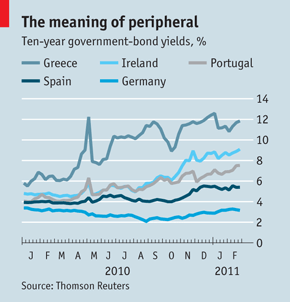March 9th 2011
Euro Buoyed by Rate Hike Expectations, Despite Unresolved Debt Issues
From trough to peak, the Euro has risen 9% over a period of only two months. You wouldn’t ordinarily expect to see this kind of appreciation from a G4 currency, especially not one whose member states are on the brink of insolvency and which itself faces threats to its very existence. In this case, the Euro is benefiting from expectations that the European Central Bank (ECB) will be among the first and most aggressive in hiking interest rates. As I warned in my previous post, however, those that focus solely on interest rate differentials and ignore the Euro’s lingering Sovereign debt crisis do so at their own peril.
Indications that the ECB will hike interest rates came out of nowhere. Jean-Claude Trichet, President of the ECB, announced last week that it would be particularly aggressive in taking steps to deal with inflation. This caught the markets by surprise, since Eurozone inflation is still below 2% and GDP growth is similarly low. Later, Governing Council members Mario Draghi and Axel Weber (both of whom are potential candidates to replace Trichet when he steps down later this year), issued similar statements, and the question of rate hikes was suddenly changed from If to When/How much.
Futures markets are currently pricing in 3 interest rate hikes, which would bring the Eurozone benchmark rate to 1.75% by year end. According to economist Nouriel Roubini’s (who gained fame by predicting the financial crisis) think tank: “Jean-Claude Trichet has been careful not to commit to a series of hikes, but we believe that is what it will be. The ECB is bluffing. We think the ECB will hike by a total of 75 basis points, probably by August.” Axel Weber, himself, coyly echoed this sentiment: “I see no reason at this stage to signal any dissent with how markets priced future policies.”
On the one hand, the recent rise in oil prices strengthens the case for rate hikes. On the other hand, the EU does not consume energy at the same intensity as the US, which means that its impact on inflation is likely to be muted. In addition, while the ECB’s mandate is indeed titled towards price stability (rather than boosting employment or spurring economic growth), to hike rates now would risk endangering the still-fragile Eurozone economic recovery. Unwinding its quantitative easing would similarly add to the risk of another financial crisis, since banks still make heavy use of its emergency lending facilities.
Speaking of which, it’s still way too early to say that the the EU sovereign debt crisis is behind us. Despite the loans and pledges and bailouts, interest rates for all four PIGS (Portugal, Ireland, Greece, Spain) countries continue to rise, and or nearing unsustainable levels. At the moment, currency investors have chosen to ignore this, since the EU has basically guaranteed them funding until 2013. What will happen then, or as the date draw near, is anyone’s guess.

In the end, one or more defaults seems inevitable. There is only so much that financial engineering can do to conceal and restructure debt which exceeds 100% of GDP in the cases of Greece and Ireland. If that were to happen, significant losses would be incurred by EU banks, which lent heavily to at-risk countries during the boom years. In order to minimize this situation, I think the ECB will probably continue to subsidize the banks via low interest rates.
Even if the ECB does hike rates, it will be extremely gradual. Furthermore, By the time Eurozone interest rates reach attractive levels, the other G4 Central Banks (with the exception of Japan) will probably already have started to close the gap. That means that interest rate differentials probably won’t soon be wide enough to lure more than a modicum of risk-averse investors. (Besides, if you assume a 5% chance of default, risk-adjusted rates are probably still negative).
In short, I think that the ongoing Euro rally is really just a short squeeze in disguise. Basically, speculators are conceding that shorting the Euro is both risky and unprofitable. (According to one hedge fund manager, “It was a very popular trade,” the portfolio manager says. A lot of us stuck with it, and it went wrong in January.”) In anticipating of higher future interest rates, they are preemptively moving to liquidate their short positions. However, not being short is not the same thing as going long. And until the EU sorts through the fiscal issues in a convincing way, I think it would be foolish to start making long-term bets on the Euro.





March 9th, 2011 at 10:55 pm
Last weeks CFTC data shows almost record bets on long Euro appreciation, most of the positions are taken by large institutions are bets in the short term. The private wealth investors hasn’t jump on the band wagon yet.
ECB’s art of deception
March 10th, 2011 at 4:56 am
Raising rates is like strangling the PIGS, why on earth BCE is more hawkish than, let’s say, BOE?
Jan EMU CPI came worst than expected at 2.3% and yet still far below UK’s CPI of 4%, is it really the risk of high inflation for healthy countries like Germany higher than risk of default from other countries like Portugal or Spain?
I think I’m missing something, or maybe the markets are just desperate for rate hikes.